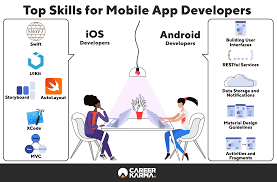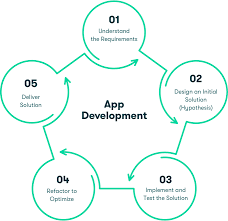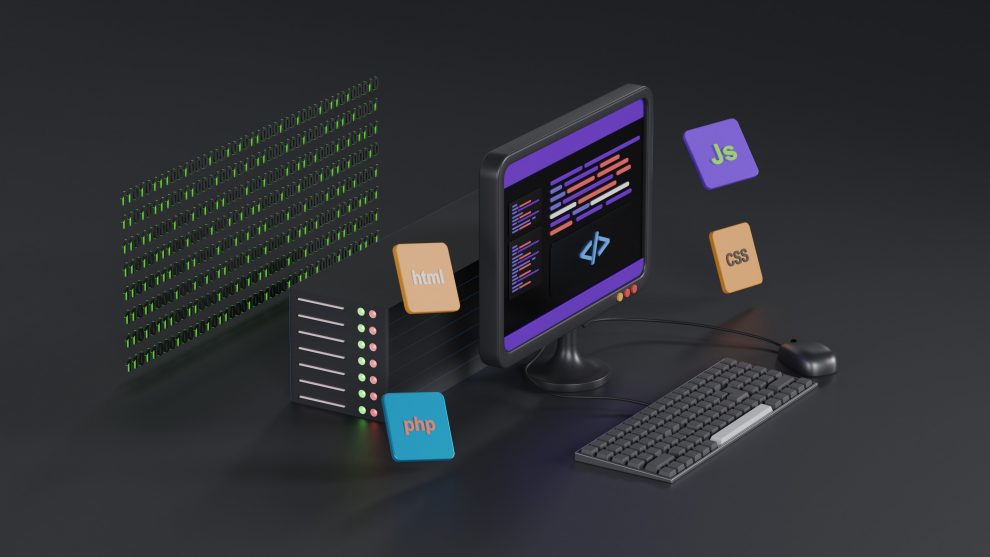A successful mobile app developer in the USA possesses a diverse skill set that goes beyond coding proficiency. At the core of their expertise is a deep understanding of user-centered design. They are adept at conducting user research to identify user needs, preferences, and pain points, which inform the development process.
Technical skills are paramount, encompassing proficiency in programming languages such as JavaScript, Java, Swift, or Kotlin, depending on the platform. Mobile app developers in the USA are well-versed in utilizing frameworks and libraries like React Native, Flutter, or Xamarin to build cross-platform applications efficiently.
These professionals excel in mobile app architecture, ensuring scalability and robust performance. They are adept at optimizing app performance for diverse devices and networks, with a keen eye on minimizing load times and resource consumption.
Moreover, Mobile App developers in the USA prioritize security and data privacy, adhering to industry regulations like GDPR and HIPAA. Continuous learning and staying updated with the latest technologies and trends, such as augmented reality (AR) and machine learning (ML), are integral to their skill set.
Effective communication, problem-solving abilities, and collaboration with designers and product managers are also crucial aspects of their role. By encompassing this multifaceted skill set, successful mobile app developers in the USA deliver user-centric, secure, and high-performing apps that thrive in a competitive digital landscape.
Critical Competencies for Mobile App Developers to Succeed

Successful mobile app developers possess a core set of competencies that extend beyond technical prowess, ensuring their success in a rapidly evolving industry.
First and foremost, they excel in user-centred design, conducting thorough user research to gain deep insights into user needs and preferences. This knowledge serves as the bedrock for crafting user-friendly and engaging applications.
Technical proficiency is a cornerstone of their skill set. They demonstrate mastery of programming languages like JavaScript, Java, Swift, or Kotlin, adapting to the specific demands of each platform. Utilizing frameworks such as React Native, Flutter, or Xamarin, they create cross-platform solutions that reach a diverse user base efficiently.
Mobile App developers in the USA are adept at designing scalable and robust software architectures, optimizing performance across various devices and network conditions to ensure swift loading times and minimal resource consumption.
Furthermore, they prioritize security and data privacy, adhering rigorously to industry regulations such as GDPR and HIPAA to protect user information.
In addition to their technical expertise, successful developers remain lifelong learners, staying attuned to emerging technologies like augmented reality (AR) and machine learning (ML). Effective communication, creative problem-solving, and seamless collaboration with designers and product managers round out their comprehensive skill set.
In conclusion, mobile app developers’ critical competencies encompass a multifaceted skill set that empowers them to deliver secure, high-performing, and user-centric applications, positioning them for success in the fiercely competitive digital landscape.
Understanding the Phases of Mobile App Development

Mobile app development is a systematic process that involves several distinct phases, each crucial for creating a successful application. Here, we’ll explore these phases to provide a comprehensive overview of the mobile app development process.
Ideation and Conceptualization :
The journey begins with brainstorming ideas and conceptualizing the app’s purpose. This phase involves market research, identifying user needs, and defining the app’s core features.
Planning and Strategy :
Once the concept is clear, developers create a detailed plan and strategy. This includes defining the app’s scope, target audience, platform (iOS, Android, or both), and technology stack.
Design and Prototyping :
Designers create wireframes and prototypes to visualize the app’s layout and functionality. User interfaces (UI) and user experiences (UX) are designed, to ensure an intuitive and visually appealing design.
Development :
The actual coding and development of the app take place in this phase. Developers write the code, integrate APIs, and implement the features defined in earlier stages. Regular testing is essential to catch and address issues promptly.
Testing and Quality Assurance :
Rigorous testing ensures the app functions smoothly, is free of bugs, and offers optimal performance. Testing includes functional, usability, security, and compatibility testing.
Deployment and Release :
The app is prepared for release to the chosen app stores, such as Apple App Store and Google Play Store. Developers handle submission, review processes, and ensure compliance with platform guidelines.
Marketing and Promotion :
An effective marketing strategy is crucial for app success. Developers promote the app through various channels to reach the target audience.
User Feedback and Iteration :
Post-launch, user feedback is collected and analyzed. Developers use this input to make improvements, add new features, and release updates.
Maintenance and Support :
Continuous maintenance is essential to keep the app compatible with new OS versions, fix bugs, and ensure security. Support teams address user queries and issues promptly.
Understanding these phases of mobile app development is vital for creating a well-planned, user-friendly, and successful mobile application. Each phase contributes to the overall quality and effectiveness of the final product, making it essential to follow a structured approach throughout the development journey.
Diverse Approaches to Mobile App Development

Mobile app development offers a multitude of approaches and methodologies tailored to meet various project requirements, target audiences, and technical constraints. Here, we delve into the diverse approaches to mobile app development that developers can adopt:
Native App Development :
Native app development involves building applications exclusively for a single platform, either iOS or Android. It leverages platform-specific languages like Swift or Objective-C for iOS and Java or Kotlin for Android. Native apps excel in performance and access to device features but require separate development efforts for each platform.
Cross-Platform App Development :
Cross-platform development enables developers to create apps that run on multiple platforms using a single codebase. Frameworks like React Native, Flutter, and Xamarin facilitate this approach, allowing developers to save time and effort while achieving near-native performance.
Hybrid App Development :
Hybrid apps combine elements of both web and native apps. They are essentially web apps wrapped in a native container. Tools like Apache Cordova or Ionic enable developers to access native device features while using web technologies like HTML, CSS, and JavaScript.
Low-Code/No-Code Development :
Low-code and no-code platforms simplify mobile app development, allowing individuals with minimal coding experience to create functional apps using visual interfaces and pre-built components. These platforms accelerate development and reduce the need for extensive coding.
Enterprise Mobile App Development :
Enterprise apps are customized for businesses to enhance productivity and streamline operations. They often integrate with existing systems and databases and prioritize security and scalability.
Game Development :
Game development focuses on creating mobile games, requiring specialized skills in game engines, graphics, physics, and user engagement strategies.
Augmented Reality (AR) and Virtual Reality (VR) Development :
AR and VR apps blend the digital and physical worlds, offering immersive experiences. They are commonly used in gaming, education, training, and marketing.
IoT-Driven App Development :
Internet of Things (IoT) apps connect mobile devices with smart devices, enabling control and data exchange. These apps often require expertise in IoT protocols and cloud integration.
Choosing the right development approach depends on factors like project scope, budget, time constraints, and the target audience’s preferences. Developers must evaluate these options to select the most suitable approach for their specific mobile app development endeavours.
3 Most Popular Skills for Mobile Application Developers

The field of mobile application development is dynamic, with evolving trends and technologies. As of my last knowledge update in September 2021, here are the three most popular and essential skills for mobile application developers:
Programming Languages :
Swift and Objective-C (iOS): For iOS app development, proficiency in Swift and Objective-C is crucial. Swift, introduced by Apple, has become increasingly popular due to its modern syntax and performance advantages.
Java and Kotlin (Android): Android app development relies on Java and Kotlin. Kotlin, officially supported by Google, has gained significant traction for its conciseness and safety features.Cross-Platform Development :
React Native: Developed by Facebook, React Native enables developers to create mobile apps for multiple platforms using a single codebase. It’s a popular choice for building apps that need to work on both iOS and Android.
Flutter: Google’s Flutter framework is known for its fast development and expressive UI. It uses the Dart programming language and is suitable for cross-platform app development.
Xamarin: Owned by Microsoft, Xamarin allows developers to use C# and .NET to build cross-platform apps for iOS and Android.UI/UX Design Skills :
Strong UI/UX design skills are crucial for creating visually appealing and user-friendly mobile apps. Understanding user interfaces, design principles, and user experience best practices is vital for creating apps that users love.
Proficiency in design tools like Adobe XD, Sketch, or Figma can aid in creating prototypes and mockups for app interfaces.
It’s important to note that the mobile app development landscape is continuously evolving, and new technologies and tools may have emerged since my last update. Developers should stay updated with the latest trends and adapt their skill sets accordingly to remain competitive in the field. Additionally, soft skills like problem-solving, communication, and teamwork are valuable for success in mobile app development projects.
FAQ’S
1. What are the primary technical skills that a successful mobile app developer in the USA should possess?
A successful mobile app developer should be proficient in programming languages such as JavaScript, Java, Swift, or Kotlin, depending on the platform. They should also have expertise in utilizing frameworks and libraries relevant to mobile app development, like React Native, Flutter, or Xamarin.
2. Why is user-centered design considered a critical skill for mobile app developers in the USA?
User-centered design is essential because it ensures that mobile apps meet the specific needs and preferences of users in the competitive USA market. Understanding user behaviour and expectations is crucial for creating apps that resonate with the target audience.
3. How can a mobile app developer in the USA stay updated with emerging technologies and trends in the field?
Developers can stay updated by actively participating in developer communities, attending conferences, and taking online courses. Following tech blogs, forums, and social media channels related to app development is also a valuable practice.
4. What are some key considerations for ensuring security and data privacy in mobile app development in the USA?
Developers should implement robust encryption, and secure authentication methods, and conduct regular security audits. It’s essential to adhere to data privacy regulations like GDPR or HIPAA, if applicable, and maintain transparent privacy policies.
5. How do successful mobile app developers in the USA approach collaboration with designers and product managers?
Collaboration involves effective communication, sharing ideas, and understanding each team member’s perspective. Developers work closely with designers to ensure a seamless user interface and collaborate with product managers to align development efforts with business goals.

















